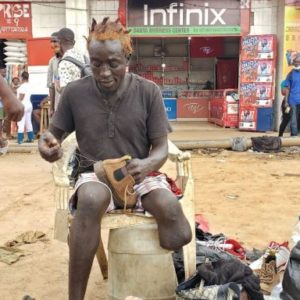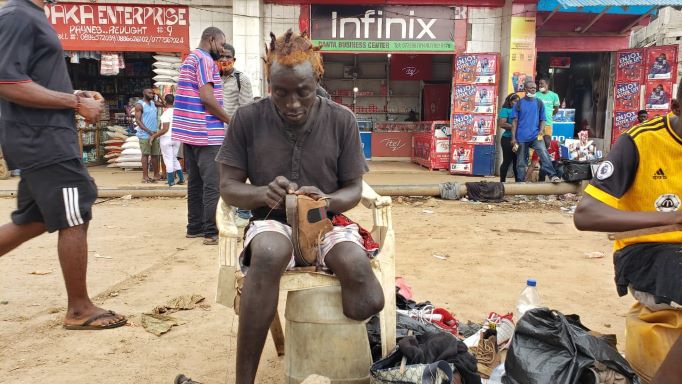PHOTO: Joseph plying his trade
By R. Joyclyn Wea
Joseph Saidee, a 36-year-old person with physical disability sits on the side walk in Red-Light suburb of Monrovia not to beg for alms, but to make an honest living by repairing and shining shoes.
Rain or shine, he’s at his work sewing and shining shoes daily in the open air.
Determined to catch up, Joseph sews and shines shoes to pay his rent, earning LRD$20 to LRD$100 dollars per a pair of shoes, depending the condition it is in. His mother, fiancée and daughter are all living in the same community and they all some way depend on him for end meets.
Joseph says 18 years ago, his leg was amputated as the result of what he called ‘poisoning’ that throw him backwards, as he could not complete primary school.
There are many other Liberians like Joseph, who experienced some form of disability at an early age, thus making them school dropout. Like Joseph, there are some too who did not allow that to reduce them to street beggars.
As a result, this young determined PwD has decided to defy the odds and venture into engaging in productive activities, which is at least providing some of his needs and enabling him to help his poor mother who could not afford to underwrite all his expenses.
In this country with over 85 percent unemployment, shining and repairing shoes was the only option that has been available to Joseph.
Many years ago, the Liberian government established the Group of 77 to cater for the welfare of disabled people, which he said he has not benefitted from. The National Commission on Disability (NCD) is now in place and Joseph is hoping that he will feel the impact of its presence.
As part of government’s responsibility, it should provide accommodation, feeding, health care and many other needs for those living with disabilities.
But sadly, many persons living with disabilities are seen on the sidewalks begging for handouts to enable them make ends meet for themselves and their families. Joseph says he does not feel good to see such a situation.

While it is true that the government has the responsibility to cater for those with disabilities in Liberia, Joseph thinks it is also important that those in such conditions ‘make other ways to ensure that life does not leave them on the highways (dropout).’
He wants the relevant government institutions to introduce skills training programs for PwDs.
“Anybody can become disabled any time,” this physically challenged shoe repairer said, adding that one does not ask to be made disabled.
According to him, when the right programs are introduced, it will help anyone to realize their dreams by venturing into those skill training programs which he said should be sponsored by the Liberian government.
Often in Liberia, disability is seen by some as divine retribution for a person’s misdeeds and they are discriminated against.
Said Joseph: “I am doing this because I don’t want to go begging people before they tell me that they are not the one who told me to go fight war. It is through this shining shoe I get money.”
Government revenue is said to have grown by 400 percent in recent times. Eight out of 10 Liberians still live on less than 1.25 US dollars a day according to the World Bank.
Reflecting on how he became disabled
Joseph said he became disabled back in 2003.
“I was having a big leg and I was taking to the hospital, the doctor tried to make my leg come back to normal, but each time they do the work, after two to three months, the leg gets swallowing again, it was then the doctor discovered that cancer had entered my leg and there was no other way they could help, order than to cut the leg, that was how I got amputated in 2003.”
Besides sewing and shining shoes, Joseph also makes African slappers, something he has been doing for the last six years.
“I learned this from one Ghana man. He had his shop in Gardnersville, where I once lived,” Joseph told this Reporter.
“He used to help me with shoe protector that’s how I decided to asked him to teach me so that I can stand on my own and that was how I learned how to fix African slappers and banner.”
Joseph is hopeful about the future, as he has his life ahead of him, believing that someday to come, the government or some humanitarian organization will help him make something out of the little he has started on his own.
This young and energetic physically challenged man does not want to remain doing his shoes repairing work on the sidewalk, but he wants improvement and value added.
He also wants people to assist him some in getting materials that would help him open a more sustainable business, adding he wants, “an area where I will be fixing my African slappers and other African things which I’m working towards.”
Exact statistics about disability in Liberia are out of date, but according to a 1997 UNICEF study, 16 percent of the population has a disability. Of that, 61 percent struggle with mobility, 24 percent are visually impaired, seven percent are deaf and eight percent have an intellectual or psychosocial disability.
The Swedish International Development Cooperation Agency (SIDA) in 2014 estimated that closed to 20 percent of the population of people are with disabilities in Liberia due to the devastating civil war that ended 2003 and the deadly Ebola outbreak in 2014.
Persons with disabilities in Liberia tend to be marginalized, stigmatized, and excluded from education, skills training and income-generating opportunities, which is largely because they have a limited voice in politics and society.
Their issues are not included in national policies, especially in poverty reduction initiatives causing their living conditions to continue to deteriorate in a ‘vicious cycle.’ According to SIDA, 99 percent of people with disabilities in Liberia live in extreme poverty.
Liberia is taking steps to improve the lives of those living with disabilities. In 2012, the nation signed and ratified the U.N. Conventions on Human Rights of persons with disability as well as other treaties that reference the rights of the child, the African Charter on Human and People’s Rights, the Convention on the Elimination of all forms of Discrimination against women.
It also formed a national commission on disability and is reviewing its constitution to address the rights of PWDs.
Job opportunities
People with disabilities in Liberia are often excluded from job skills training, work, and income generating opportunities.
Ending social stigma, working to improved healthcare access and workplace accommodations will help lift people with disabilities in Liberia out of poverty, says Mmonbeydo Nadia Juah, Executive Director of the Organization for Women and Children.
Madam Juah asserted that stigma around these conditions prevent PwDs from having a voice and escaping extreme poverty with the help of NGO’s and the Liberian Government, the lives of PwDs can be improved.
Several PwDs are empowered through National Commission on Disability and the National Union Organization for Persons with disabilities, but there is still much needed to be done to uplift the lives of PwDs and to achieve the four percent work rights as required by the 2005 establishing the commission.
“There is still a very big need for us to keep pushing Government, parents, community and everyone concern with PwD to ensure we achieve this, pwd must be given the opportunity if there is employment by Government to other citizens, disable people must also be empowered to be employed and start working for their life to benefit their family and children because even PwDs has wife, husband and children,” Rev. Fallah Boimah said in an interview with this Reporter.
The National Commission on Disabilities represents all persons with disability in Liberia both internationally and locally at the government level and with the Liberian citizens. NCD plays an advocacy role for PwDs, by ensuring they have their livelihood, training, access to jobs and other essential things that disabled people need.
“We also have disable people working with NGOs in Liberia that are working with PwDs though that’s just a drop in the occasion because disable people should have employment and be empowered which we are still working to achieve,” said Rev. Boimah said.
When it comes to the NCD’s intervention with national government, the Liberia government has considered NCD as an entity that worked for government as was established by the act of legislation in 2014.
According to him, NCD has worked in many ways for PwDs and made immense interventions for persons with disabilities.
NCD is also said to intervene for PwDs when they are facing legal processes. It is said that when somebody takes them to court or violate their rights, the commission tries to intervene with government or whoever that might have violated their rights.
On the issue of discrimination against PwDs, the NCD Director said there is high discrimination against PwDs, even the human rights on person with disability in Liberia is very much complicated.
“All PwDs in Liberia are entitled to all human rights of people in Liberia, whatsoever right a normal person has equally so the PwDs should have it, but sadly, PwDs are not having equal rights as non-disabled because we find it on a daily basis that even in the disabled people home where mothers and fathers are, they ignore the PwDs.”
He added, “They denied them of their rights to education, equal participation in the home especially.”
According to Rev. Boimah, if disabled people are to be educated most times, it has to be by their own willingness and people who are working with people with disability.
“So, there is highly discrimination against PwDs, even the human rights on persons with disabilities in Liberia is very much complicated.”
The 36-year-old Joseph Saidee is still hopeful that one day, the right things will be done and they (persons with disabilities) will be empowered by government or people of goodwill so that they reach their potentials in life. Publication of this article was made possible with support from Internews Inclusive Media project

